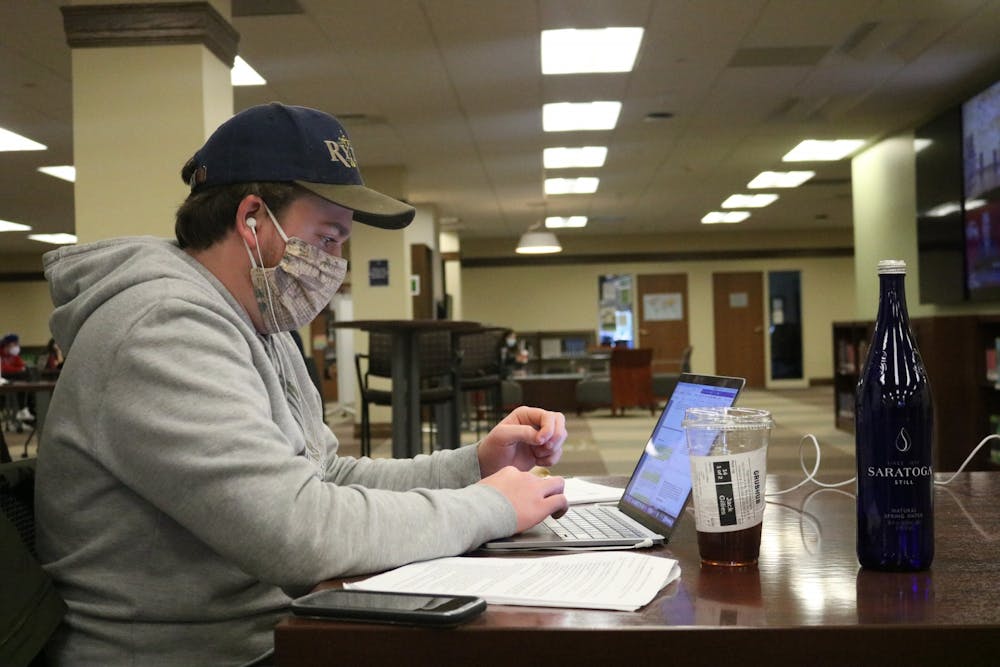With more information about masks becoming available as the COVID-19 pandemic continues, the University of Richmond updated its mask requirements and is distributing KN95 and ASTM-certified level 3, meaning high barrier, disposable masks on campus.
The aforementioned masks are certified by the Food and Drug Administration and the American Society of Testing and Materials, respectively.
New policies and information regarding masks on campus were announced in a Feb. 4 email to the campus community, sent by Steve Bisese, vice president for student development; Jeffrey Legro, executive vice president and provost and executive vice president and chief operating officer; and David Hale, executive vice president and chief operating officer.
“If a mask does not have two or more layers, double masking is an option," the administrators wrote. "Neck gaiters and bandannas are not acceptable to be worn within campus buildings unless they are covered by a second mask."
As a motivation for these policies, the email cited the Centers for Disease Control and Prevention's recommendation of wearing a snug cloth mask with at least two layers over the nose and mouth, and the new rule requiring mask-wearing on any forms of public transportation announced by U.S. President Joe Biden in January.
Gaiters were distributed to student-athletes at the beginning of the fall semester and have been worn by students around campus, Jason Vida, associate director of athletic public relations, said. Because of the changes in information regarding the efficacy of different types of masks, gaiters are now unacceptable masks to wear in campus buildings, Vida said.
A peer-reviewed Duke University study from August 2020 showed that a single-layer gaiter was less effective than not wearing a mask. The study caused controversy and some experts argued against the findings and conducted their own gaiter experiments, according to The Washington Post. Some studies have shown that a single-layer gaiter worn doubled up is effective, although there is still a lack of a clear consensus on the issue, according to the Post.
Athletes are now only supposed to wear their gaiters when they are on the athletic field with teammates, as masks with ear loops are not always practical, Vida said. This is because athletes must take their face coverings off for activities involving heavy breathing and put them back on for time-outs, Vida said. Ear-loop masks would be difficult to collect from the field if taken off for these instances or if they fell off by accident, he said.
“There's a lot of different information that continues to evolve," Vida said. "So, you know, I think that the most important thing is that there is probably a time and a place for each type of mask."
Because student-athletes will start to travel again for games, possibly being exposed to the COVID-19 virus, KN95 masks were given to student-athletes for them to wear around campus, Vida said. He calling mask-wearing a “two-way street," as masks protect both the wearers as well as those around them.
Student-athletes received another gaiter at the beginning of this semester to be worn at practices; and in February they received two KN95 masks, senior field hockey player Kayla Somers. Somers got a full box of KN95 masks when they were distributed at the Heilman Dining Center, she said.
Each sports team has COVID-19 ambassadors to help keep teams aware of safety rules, Vida said. The Athletics Department update these ambassadors about new COVID-19 safety procedures every Thursday, he said.
Enjoy what you're reading?
Signup for our newsletter
Although it can be difficult to keep up with changing rules, everyone on her team is very conscientious about mask-wearing, Somers said.
The Feb. 4 email from Bisese, Hale and Legro announced that UR would distribute a box of Food and Drug Administration-certified KN95 or American Society of Testing and Materials-certified level 3 disposable masks to each student taking in-person classes, after distributing masks to faculty and staff first. Details on where and when mask distribution would take place were given in a later email sent by Bisese and Legro on Feb. 12.
Richmond College Student Government Association and Westhampton College Government Association members distributed masks on Feb. 11 in the dining hall and in the hanging lounge of Tyler Haynes Commons. Students can also pick up masks in the Special Programs Building, according to the Feb. 12 email.
Masks were also distributed in the dining hall and Commons on Feb. 25.
Junior Kevin Spear was one of the RCSGA members distributing masks in the Commons on Feb. 11. He estimates that, during the two hours he distributed masks, he gave out over 200 boxes.
“Almost everyone is willing to take at least one box,” Spear said. “If not, you know, they're asking if they can take two.”
Junior Meredith Johnson said she saw some inconsistencies in mask distribution among students. One of her roommates, who had prevalence testing early in the day on Wed., Feb. 10, received a box of surgical masks; Johnson received KN95 masks at her testing later in the day, she said. It was unclear why some students received KN95s and others received surgical masks at prevalence testing, she said.
Johnson saw the the distribution of masks on campus in the dining hall and the Commons advertised on social media, which enabled those she knew who did not receive KN95 masks at prevalence testing to get a box, Johnson said.
“It seemed very unorganized initially,” she said.
Contact newsletter director Eileen Pomeroy at eileen.pomeroy@richmond.edu.
Support independent student media
You can make a tax-deductible donation by clicking the button below, which takes you to our secure PayPal account. The page is set up to receive contributions in whatever amount you designate. We look forward to using the money we raise to further our mission of providing honest and accurate information to students, faculty, staff, alumni and others in the general public.
Donate Now

